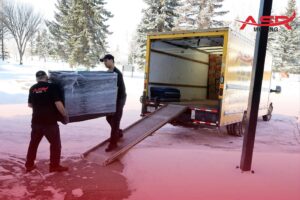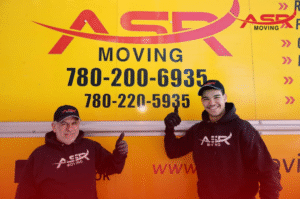Moving to a new home is exciting but can also feel overwhelming. Whether you’re relocating within Edmonton or moving to another city, careful planning will make your move stress-free. A detailed checklist helps you stay on track, avoid surprises, and settle into your new home smoothly.
This guide covers everything you need to do before, during, and after your move, so you can focus on enjoying your new home instead of worrying about the details.
Moving Timeline: A Step-by-Step Guide
4-6 Weeks Before Moving Day
The first step in planning your move is choosing a moving date that works for your schedule. If possible, avoid the beginning and end of the month, as these tend to be the busiest times for moving companies.
Hiring Movers vs DIY Move
Next, decide whether you’ll be moving on your own or hiring professional movers. If you have a lot of belongings or limited time, a moving company like Asr Moving can take care of packing, transportation, and even junk removal, making the process much easier.
If you’re hiring a moving company in Edmonton or renting a truck, book as early as possible to secure your preferred date. Moving companies often provide additional services like packing, storage, or furniture assembly, so be sure to ask about these options when making your reservation.
Declutter Your Home
Now is also the perfect time to declutter your home. Go through your belongings and decide what to keep, donate, sell, or throw away. Reducing the number of items you need to move will save time, money, and effort. Creating an inventory list of your valuables will also help keep track of everything and prevent loss during the move.
Create a Moving Budget
Moving expenses can add up quickly, so planning ahead will help you stay on track. Be sure to factor in:
- Moving services: Hiring professional movers or renting a truck.
- Packing supplies: Boxes, tape, bubble wrap, and other materials.
- Utility setup and deposits: Electricity, water, internet, and other essential services at your new home.
- Travel costs: Gas, hotel stays, or flights if you’re moving long-distance.
- Unexpected expenses: Emergency repairs, last-minute supplies, or temporary storage.
By setting a budget early, you can avoid financial surprises and ensure a smooth transition to your new home.
2-3 Weeks Before Moving Day
With moving days approaching, it’s time to handle important updates, plan packing, and make final preparations to ensure a smooth transition.
Update Your Address
Make sure all important contacts have your new address to avoid missed mail or service disruptions. Notify:
- Government Agencies: Alberta Health, vehicle registration, and licensing offices.
- Banks & Insurance Providers: Update your address to avoid billing issues or lapses in coverage.
- Subscription Services: Streaming platforms, meal deliveries, and online shopping accounts.
- Employer & Schools: Ensure they have your new address for payroll, benefits, and official records.
Consider setting up mail forwarding with Canada Post to catch any mail sent to your old address.
Schedule Utility Transfers
Contact your electricity, water, gas, and internet providers to schedule service activation at your new home. Ideally, set up these services a day before you move in so everything is ready when you arrive. Don’t forget to schedule a shut-off date for utilities at your current home to avoid unnecessary charges.
Start Packing Non-Essential Items
Begin packing things you don’t use daily so you’re not overwhelmed at the last minute move.
Focus on:
- Seasonal clothing (winter coats, summer swimwear, etc.)
- Extra kitchenware (baking dishes, special occasion glassware)
- Decorations & books
Label each box with its contents and destination room to make unpacking efficient. Consider using color-coded labels for quick identification.
Plan Meals to Reduce Food Waste
With just a couple of weeks left, start using up perishable food in your fridge and freezer. If you have non-perishable food items that you can’t take with you, donate them to a local food bank instead of throwing them away.
Car Preparation for Long-Distance Moves
If you’re driving or moving long distance to your new home, make sure your car is in good shape for the trip:
- Check tire pressure, brakes, and fluid levels to avoid breakdowns.
- Ensure your registration and insurance are valid and up to date.
- Pack an emergency kit with essentials like: A flashlight and extra batteries, jumper cables, first-aid supplies, blankets, and bottled water.
1 Week Before Moving Day
With just a week left until your move, it’s time to finalize the details and make sure everything is in place for a smooth transition.
Pack Your Essentials Box
Your first 24 hours in your new home should be stress-free, so pack a box with everything you’ll need immediately:
- Toiletries (toothbrush, toothpaste, soap, toilet paper)
- Chargers for phones, laptops, and other essential devices
- Important documents (lease, IDs, moving contract)
- Medications and a basic first-aid kit
- Snacks and bottled water for quick energy
- A change of clothes and basic kitchen supplies (plates, utensils, a coffee maker)
- Pet essentials (if applicable) like food, water, and favorite toys
- Cleaning supplies for any last-minute touch-ups
Keep this box with you rather than packing it with the rest of your belongings to avoid rummaging through boxes when you arrive.
Confirm Moving Details
Prevent last-minute surprises by double-checking all arrangements with your movers or truck rental company. Call a few days before moving day to confirm:
- Arrival time: Ensure you’re on the same page about when they’ll arrive.
- Pick-up and drop-off addresses: Ensure they have the correct locations to avoid delays.
- Last-minute requests: If you need additional services like extra packing help or furniture disassembly, now is the time to ask.
- Payment details: Verify the cost and payment method to avoid confusion on moving day.
If you’re renting a truck, confirm your reservation and check what time you can pick it up.
Real World Example of Moving Timeline
Here is an example of a moving plan made by Georgi Petrov, CMO at AIG MARKETER
He told us how crucial a moving checklist was to keeping stress in check during his move. Surprisingly, it wasn’t the heavy lifting that caused the most anxiety—it was the small, easily overlooked details. For instance, he nearly forgot to update his mailing address with the bank and missed an important notice.
What made the biggest difference was organizing tasks by timeline:
- 8 weeks out: Start decluttering and book movers early—reputable ones get reserved fast.
- 4 weeks out: Begin changing addresses and gathering key documents.
- 2 weeks out: Pack non-essentials and arrange for utility transfers.
- Moving week: Prepare an essentials bag (toothbrush, chargers, medications) and double-check important paperwork.
One practical tip he wished he’d known earlier: label boxes not just by room, but by priority—so essential items are easy to access on the first night. From his perspective, customers value movers who proactively remind them of these details. A solid checklist doesn’t just move belongings—it makes the transition feel organized and manageable.
Another customer of ours, Joe Hawtin, who is the owner of Owner at Marin County Visitor, shared a practical tip –
“One practical tip saved me tons of hassle: I took photos of the back of every electronic device before unplugging anything. Five minutes with my phone meant I could reconnect everything in my new place without cursing at tangled cords.”
Tips for Moving in Bad Weather
Moving in Edmonton’s winter is hard and weather can be unpredictable, so take extra precautions depending on the forecast:
- Rain or Snow: Wrap furniture in plastic or moving blankets to protect it from moisture. Wear non-slip shoes for safety.
- Extreme Heat: Stay hydrated, take breaks, and avoid lifting heavy items during peak midday heat. If possible, move early in the morning or late in the afternoon.
- Icy Conditions: Salt or sand pathways before moving heavy boxes to prevent slipping. Wear gloves for a better grip on items.
Checking the weather forecast a few days in advance can help you prepare for any challenges. If severe conditions are expected, consider adjusting your moving schedule.
By taking these steps now, you’ll minimize stress and ensure a smooth moving day. Now, all that’s left is the final countdown to your big move!
Moving Day: Staying Organized and Stress-Free
Start your day early to avoid last-minute stress. Have a good breakfast, wear comfortable clothes, and do one final walkthrough of your home. Check closets, drawers, storage spaces, and outdoor areas to make sure nothing is left behind. Keeping a checklist handy can help you stay on track.
As the movers arrive, supervise the loading process to ensure everything is handled with care. Label boxes clearly, point out fragile or heavy items, and make sure they are placed securely in the truck. If you’re moving on your own, load heavier items first to create a stable base and prevent shifting during transit.
Keep your most important belongings with you at all times. Your Essentials Box, important documents, jewelry, medications, and small electronics like laptops and chargers should stay by your side. This ensures you have everything you need right away and prevents any risk of loss or damage.
Before leaving, do a final sweep of the home and check that all windows and doors are locked. If you’re moving out of a rental, take photos of each room for documentation and note the condition of the space. Return your keys to the landlord or the new tenants as needed. If applicable, take final meter readings to avoid any billing issues later.
After Moving In
Before settling in, inspect your belongings and new home for any damage. Report missing or broken items to the moving company immediately, and document any scratches, dents, or leaks for reference.
Unpack essentials first—kitchen supplies, bathroom necessities, and bedroom items—before tackling decorations and storage. Ensure utilities are working and check safety features like smoke detectors and door locks. Finally, introduce yourself to neighbors and explore nearby grocery stores, pharmacies, and public transport to settle in quickly.
A Stress-Free Move with Asr Moving
Moving marks the start of an exciting new chapter, and with Asr Moving, it doesn’t have to be stressful. Our expert team takes care of everything—from packing and transportation to junk removal—so you can focus on settling into your new home. With experienced movers who treat your belongings with care, we offer customized moving solutions tailored to your needs. Our punctual service ensures your move stays on schedule, and our upfront pricing means no hidden fees or surprises. Let Asr Moving handle the heavy lifting for you. Contact us today to book a smooth, stress-free moving experience!



